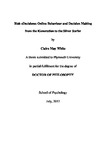Risk eDecisions: Online Behaviour and Decision Making from the iGeneration to the Silver Surfer
| dc.contributor.supervisor | Hanoch, Yaniv | |
| dc.contributor.author | White, Claire May | |
| dc.contributor.other | Faculty of Health | en_US |
| dc.date.accessioned | 2017-12-06T12:03:43Z | |
| dc.date.issued | 2017 | |
| dc.identifier | 10396641 | en_US |
| dc.identifier.uri | http://hdl.handle.net/10026.1/10376 | |
| dc.description.abstract |
Since the inception of the Internet there has been immense growth in the number of internet users worldwide, and the integration of social media in our daily lives has become commonplace for many. Yet, alongside the many benefits of this global connectivity come numerous risks. Research shows that individuals of all ages are exposed to, and engage in, risky activities online, despite numerous campaigns to highlight the perils of risky online behaviour. Although the rates of victimisation increase year-on-year, surprisingly little is known about the psychological mechanisms underlying online risk-taking. The work in this thesis aimed to address this gap in the psychological literature by conducting empirical research focussing on online risky behaviour and decision making across the lifespan. Four studies, conducted with individuals ranging in age from 13- to 79-years-old, investigated two online risk-taking behaviours, personal information disclosure and friending strangers, within the framework of Fuzzy Trace Theory. A further study investigated the posting of risky and inappropriate content online in British and Italian students, examining the role of self-monitoring and impulsivity. The work in this thesis reveals that Fuzzy Trace Theory is able to predict risk-taking and risk-averse behavioural intentions, and that the retrieval of gist-based, intuitive beliefs and values about online risk reduces risk-taking behaviour and intentions, whereas representing risk in a quantitative-based, verbatim manner leads to increased risk-taking intentions. The ability to reason using gist representations increases with age. Additionally, high self-monitoring was found to predict risky posting behaviour across different cultures. These findings offer a novel and important contribution to our theoretical and practical knowledge about risky online behaviour, and have the potential to inform the development of more effective online safety intervention programmes. | en_US |
| dc.language.iso | en | |
| dc.publisher | University of Plymouth | |
| dc.subject | Risk-Taking | |
| dc.subject | Fuzzy Trace Theory | |
| dc.subject | Online behaviour | en_US |
| dc.subject.classification | PhD | en_US |
| dc.title | Risk eDecisions: Online Behaviour and Decision Making from the iGeneration to the Silver Surfer | en_US |
| dc.type | Thesis | |
| plymouth.version | publishable | en_US |
| dc.identifier.doi | http://dx.doi.org/10.24382/943 | |
| dc.rights.embargodate | 2018-12-06T12:03:43Z | |
| dc.rights.embargoperiod | 12 months | en_US |
| dc.type.qualification | Doctorate | en_US |
| rioxxterms.version | NA |
Files in this item
This item appears in the following Collection(s)
-
01 Research Theses Main Collection
Research Theses Main


